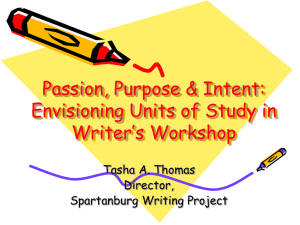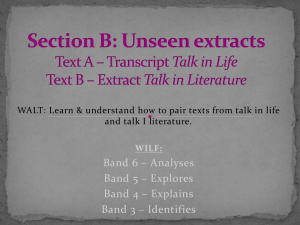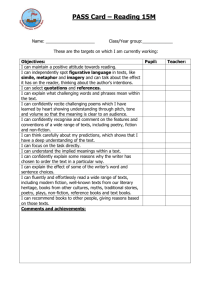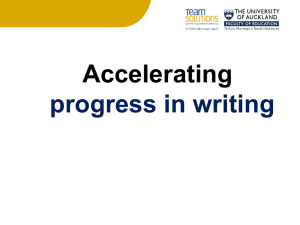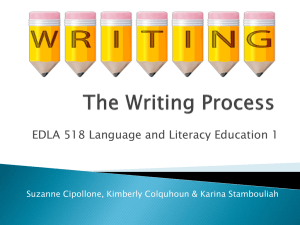Year 7 English Course Overview | Curriculum & Skills
advertisement
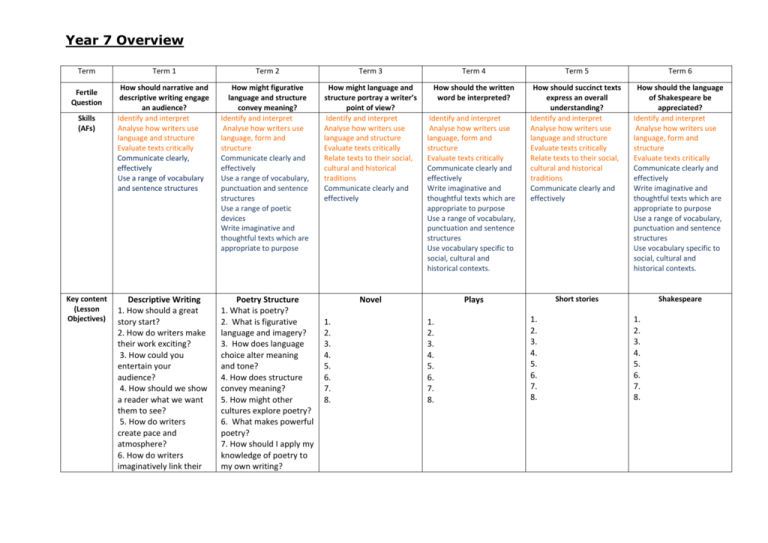
Year 7 Overview Term Fertile Question Skills (AFs) Key content (Lesson Objectives) Term 1 Term 2 Term 3 Term 4 Term 5 Term 6 How should the written word be interpreted? How should succinct texts express an overall understanding? Identify and interpret Analyse how writers use language and structure Evaluate texts critically Relate texts to their social, cultural and historical traditions Communicate clearly and effectively How should the language of Shakespeare be appreciated? Identify and interpret Analyse how writers use language, form and structure Evaluate texts critically Communicate clearly and effectively Write imaginative and thoughtful texts which are appropriate to purpose Use a range of vocabulary, punctuation and sentence structures Use vocabulary specific to social, cultural and historical contexts. Short stories Shakespeare How should narrative and descriptive writing engage an audience? Identify and interpret Analyse how writers use language and structure Evaluate texts critically Communicate clearly, effectively Use a range of vocabulary and sentence structures How might figurative language and structure convey meaning? Identify and interpret Analyse how writers use language, form and structure Communicate clearly and effectively Use a range of vocabulary, punctuation and sentence structures Use a range of poetic devices Write imaginative and thoughtful texts which are appropriate to purpose How might language and structure portray a writer’s point of view? Identify and interpret Analyse how writers use language and structure Evaluate texts critically Relate texts to their social, cultural and historical traditions Communicate clearly and effectively Descriptive Writing 1. How should a great story start? 2. How do writers make their work exciting? 3. How could you entertain your audience? 4. How should we show a reader what we want them to see? 5. How do writers create pace and atmosphere? 6. How do writers imaginatively link their Poetry Structure 1. What is poetry? 2. What is figurative language and imagery? 3. How does language choice alter meaning and tone? 4. How does structure convey meaning? 5. How might other cultures explore poetry? 6. What makes powerful poetry? 7. How should I apply my knowledge of poetry to my own writing? Novel 1. 2. 3. 4. 5. 6. 7. 8. Identify and interpret Analyse how writers use language, form and structure Evaluate texts critically Communicate clearly and effectively Write imaginative and thoughtful texts which are appropriate to purpose Use a range of vocabulary, punctuation and sentence structures Use vocabulary specific to social, cultural and historical contexts. Plays 1. 2. 3. 4. 5. 6. 7. 8. 1. 2. 3. 4. 5. 6. 7. 8. 1. 2. 3. 4. 5. 6. 7. 8. Year 7 Overview Assessment Opportunity ideas? 7. How should we create an engaging piece of descriptive writing about a tropical beach? 8. How do writers create contrast in tone, mood and setting? 8. How can I justify my language choices and evaluate their impact? End of unit assessment: Classroom based writing: descriptive writing. Classroom based reading: Comparing extracts from Golding’s Lord of the Flies. End of unit assessment: FORMAL EXAM End of unit assessment: Classroom based writing: empathy writing. Classroom based reading: novel study, comment, explain & analyse (structure and language). End of unit assessment: FORMAL EXAM End of unit assessment: Classroom based writing: opinion based writing. Classroom based reading: text study, comment, explain & analyse (structure and language). End of unit assessment: Classroom based writing: narrative writing. Classroom based reading: Play study, comment, explain & analyse.

